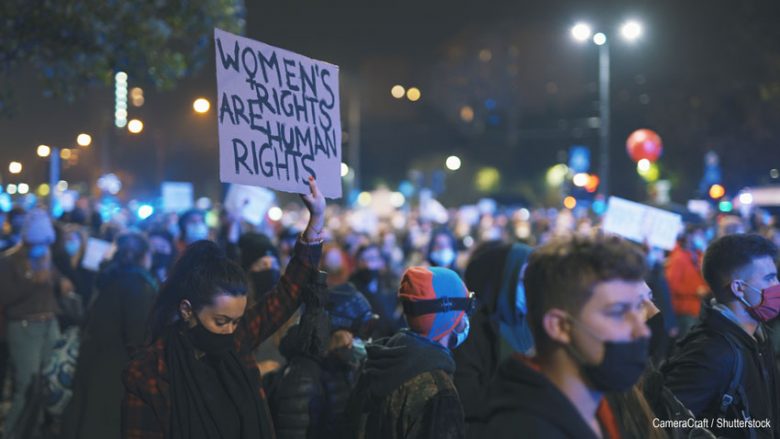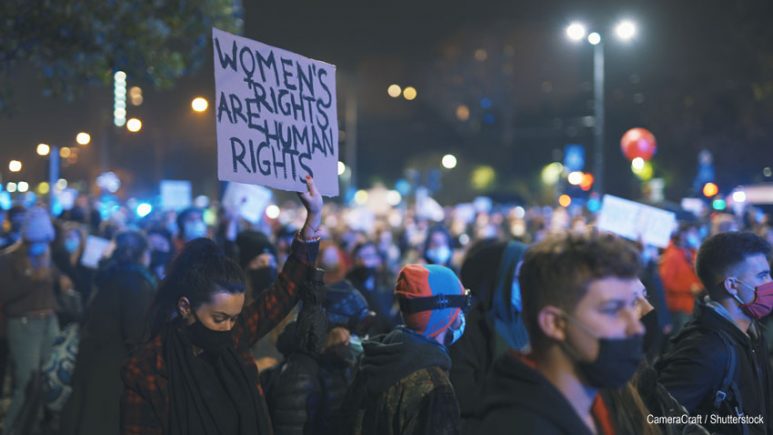By Anmol Irfan
Media coverage from most mainstream outlets put out the impression that women’s rights violations occur far more frequently in the non-western global south than they do in countries such as the US, UK or those in Europe which are generally considered far more progressive and accepting. But while the facts may stand as they are, a closer look at the reportage of these violations shows just how much international alliances and economic ties play a role in the image global media presents with regards to certain countries, and the crimes associated with them. Compared to journalism on western countries, which focuses on a range of topics from economic growth, tech industries and more to political growth and social justice, the comparatively fewer publications that actively show an interest in global coverage often limit theirs to violations in women and minority rights. Rochelle Terman, a researcher at Stanford University found in her work that “Muslim women are more likely to appear in US media coverage ‘almost exclusively’ if they live in societies with poor records of women’s rights.”
Last month, Saudi women’s rights activist Loujain al-Hathloul was released from prison, after having been arrested for her role in championing for women’s rights, and in particular as the face of the demands for women to drive in the country. After her sister tweeted that Loujain al-Hathloul was home, media outlets across the world picked up on her release, and how it was a victory for women’s rights in Saudi Arabia. The activist is being lauded as a hero, and rightfully so, given her role in shaping women’s rights in Saudi Arabia. What’s not being discussed as much, however, is the fact that despite being arrested for protesting women’s right to drive, she wasn’t released until two years after the Saudi government allowed women to drive. Some of the women who were arrested with her still face imprisonment. Political analyst and journalist Diana Alghoul believes that Loujain’s case is somewhat being co-opted by Western media.

“Western human rights organisations have placed great emphasis on Loujain al-Hathloul’s case and have branded her a poster woman of imprisoned Saudi activists,” Diana Alghoul tells MDI.
Loujain al-Hathloul’s case isn’t the only one, and neither is the issue of media representation of women’s rights violations limited to her and the country she belongs to.
“[Loujain al-Hathloul’s case] shows the power western media outlets and human rights organisations have in turning oppressed women into famous names and must do the same for all other imprisoned women,” Diana Alghoul continues.
Understanding the power that mainstream dominantly western media outlets hold brings up two very important questions. Why do these media outlets then only pick and choose certain faces to popularise, and how does this in turn impact the global women’s rights movement as a whole? The violations faced by Loujain al-Hathloul and her fellow activists are far from the only ones that women across the world have faced. While Loujain al-Hathloul has been hailed as an icon, women in other parts of the world are rarely given the same attention. This could partly also be due to vested interests by more powerful countries in the social issues within certain countries as well. According to Dr. Sherifa Zuhur, formerly professor at the Strategic Studies Institute, US Army War College, US intervention can and should play a major role in bringing real justice to Loujain and other activists like her. Dr. Zuhur believes that since it would be difficult otherwise to convince the Saudi government to practice real justice
“The US should levy Magnitsky Act sanctions on Saudi Arabia for this case,the detention and mistreatment of other activists and the planned assassination of Jamal Khashoggi inside the Saudi consulate in Istanbul,” Dr Zuhur says.
But even these moves seem to be positioned strategically. Dr Zuhur adds a key point of context to the hype around Loujain and her work as an activist.
Global women’s rights movements and media coverage
Argentina, which is a rather conservative country, recently saw a huge win in women’s rights by legalising abortion, a move that activists have been championing for years. But there’s been little news coverage surrounding the activists themselves or the efforts they have made in the country. A similar situation can be seen in the growing women’s rights movement in Pakistan, that culminates every year with the Aurat March, which is often only reported in international media with regards to the backlash the March and its organisers face. Countries like Argentina, Pakistan and other countries where religious beliefs are dominant often come under more backlash, while those in the non-western world with stronger ties to the Global North are often given more benefit of the doubt. Even countries like Poland, which have western ties but still maintain strong religious ties, see coverage of their protests and bans once again focus more on the ban itself compared to highlighting individual stories or personalities that are crucial to the movement. It’s not so much about these issues being covered that’s the problem, but rather how they are positioned and what aspect of the fight against patriarchy and oppression is made most obvious. Culturally and socially, women’s rights in India and Pakistan are developing on more or less similar lines, but where the former is praised for individual efforts within the community – such as India’s Gulabi Gang or pink ladies – who are seen as key players in the fight against oppressive patriarchal structures the latter sees more of a focus on the oppression of these movements, where even in cases of the Aurat March coverage focuses mainly on the violence or threats they face rather than the events of the march or their manifesto itself. There’s a significant lack of coverage that aims to humanise these movements in the same way as the women’s rights movement in Saudi Arabia has been through figures such as Loujain al-Hathloul.
Even her use as a figurehead is quite a strategic move by outside media.
“External media should regularly report on women’s rights issues and not take announcements such as ‘women are freely driving’ for granted. Yes, some women are driving but others can’t qualify, can’t get insurance, can’t get their cars parked, and we don’t know the true overall impact in the country,” says Dr Zuhur.
This impact of sensationalist media applies globally. Until the global media begins to cover women’s rights holistically and accurately, no victory can truly be ruled as a victory. Women across the world are still given importance based on the backgrounds they come from, and whether or not they fit already existing stereotypes of how their experiences should be in the communities they live in.
“The abysmal women’s rights situation in Saudi Arabia is a household fact, whilst the women’s rights situation in other countries is not as well known in the mainstream. It is up to human rights activists and journalists to step forward more than ever and to advocate for all women, everywhere,” Diana Alghoul tells MDI.
Photo credits: CameraCraft / Shutterstock

